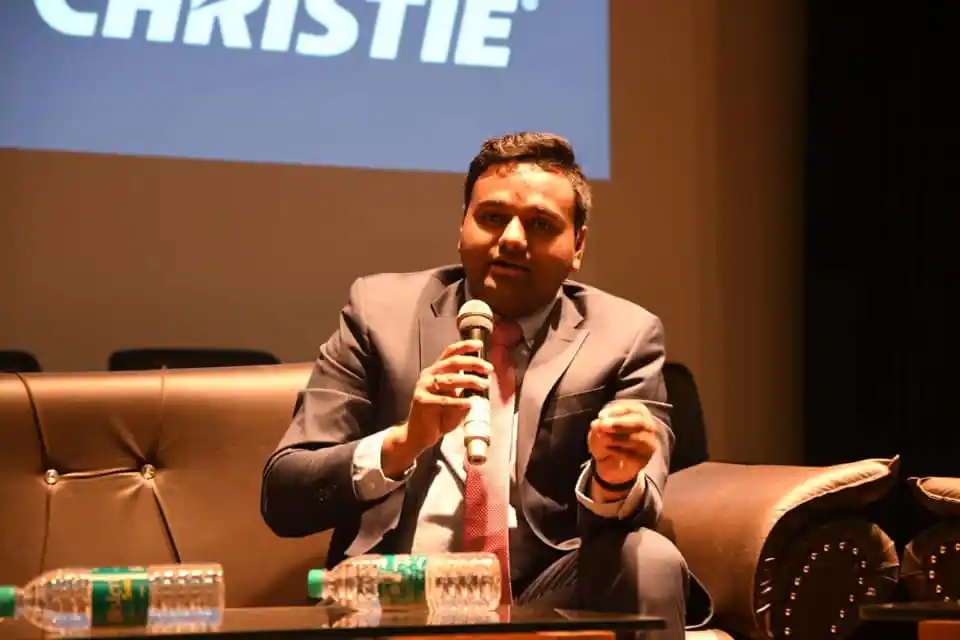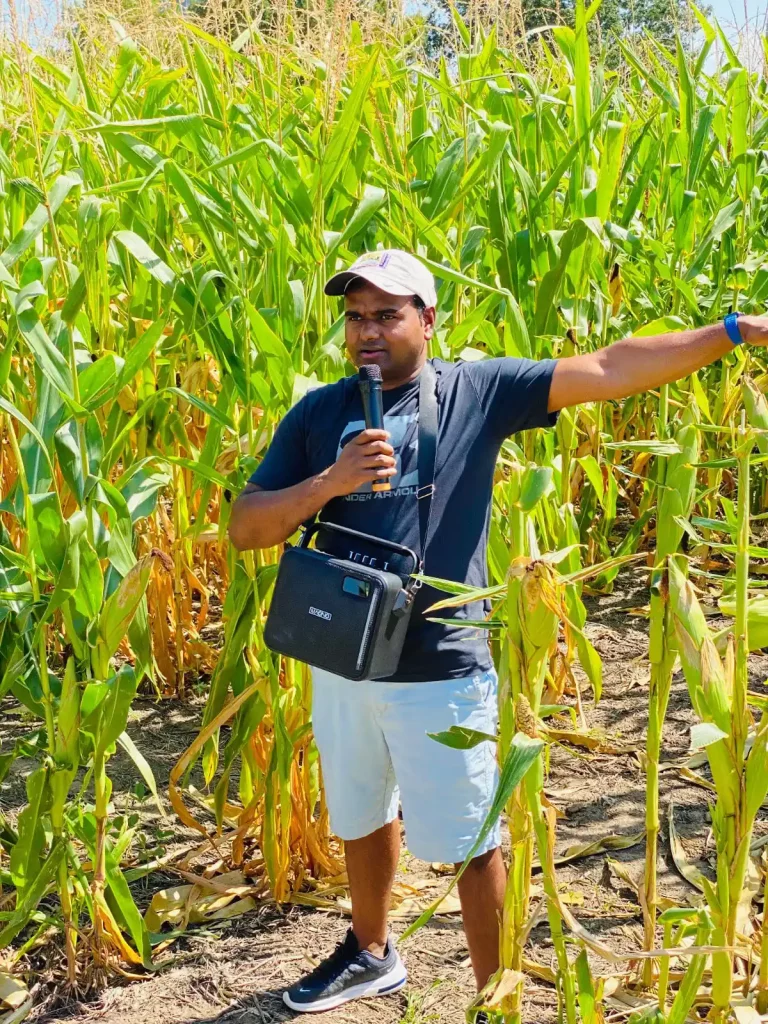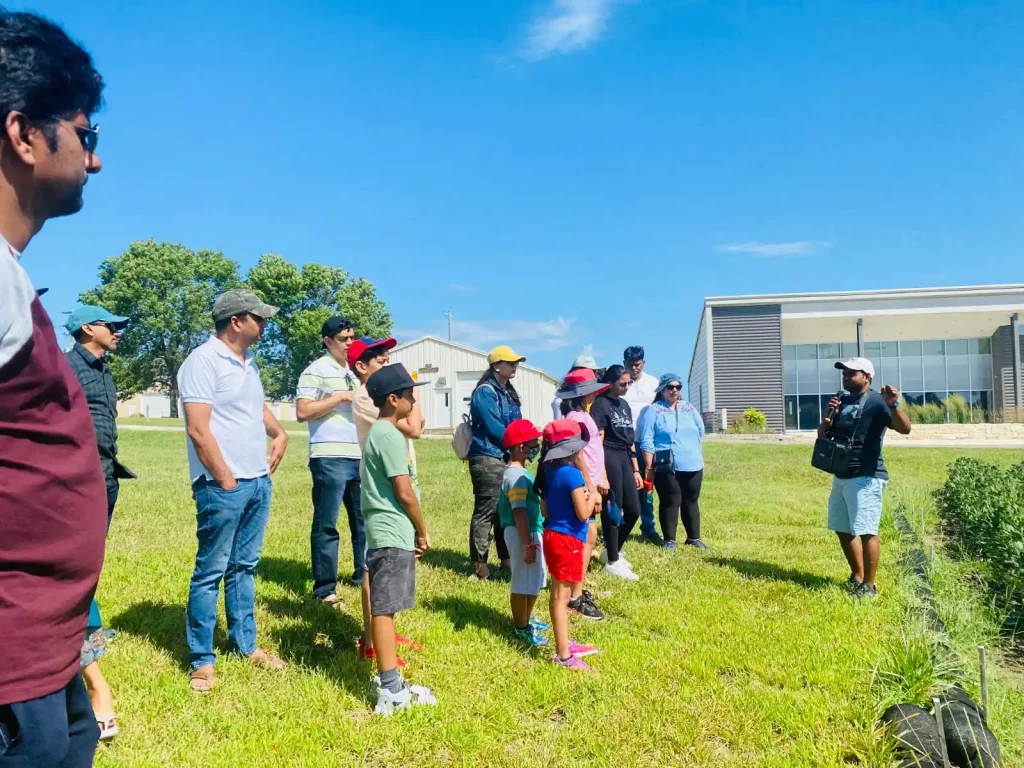(June 19, 2024) After earning a fully funded admission into a PhD program in Crop and Soil Sciences at Michigan State University, Prakash Kumar Jha, a native of Madhubani in Bihar, first landed in the US nine years ago. He was met with culture shock and a desperate need to fit in, which required improving his English and adjusting his accent to match the new environment.
This adjustment took months. Having experienced the struggles of gaining admission abroad and then striving to excel and integrate as a student, Prakash found his calling in helping others transition smoothly from students in India to scholars abroad. “In my initiative, I have mentored more than 1,000 young graduates by offering them advice on academic and career opportunities,” Prakash tells Global Indian.

Prakash Kumar Jha
His professional and voluntary accomplishments led the assistant professor of Mississippi State University to receive the Foreign Fellow Award recently from the Society for Science of Climate Change and Sustainable Environment (SSCE), an NCR-based organisation. “Usually, the Fellow Award from SSCE is conferred on senior members who are in their 50s and 60s, but for the first time in their history, they have awarded a member who is below 40,” the 34-year-old remarks.
Mentoring – a passion
Apart from working as a researcher and academic in the US, Prakash is part of several professional organisations. As a mentor, he not only guides young people on how to improve their competency but also connects them with the professional organisations he is involved with, helping them enhance their exposure and increase their networking opportunities.
One such organisation is SYAHI – Society of Young Agricultural and Hydrology Scholars of India, which he co-founded in 2019. “Now, it’s a group of 1,000 members from 40 countries,” he says. Prakash is also associated with Agricultural Scientists of Indian Origin, a voluntary organisation with members from across the globe. For a two-year term, he has been designated as the Liaison Officer to build collaborations between Indian and US agricultural scientists. He also serves as the chairperson of the agricultural vertical and secretary of the Global Indian Scientist and Technocrat Forum (GIST)—USA.

Prakash Kumar Jha
Staying connected with roots
Although Prakash looks at the US as the place that helped him build his identity, develop confidence, and find his path in life, his love for India and his fellow countrymen is central to many of his initiatives and associations.
He is associated as the adjunct faculty of agricultural meteorology, University of Agricultural and Horticultural Sciences, Shimoga, Karnataka, and precision agriculture, Shere-e-Kashmir University of Agricultural Sciences and Technology, Jammu.
As a mentor of Indian students aspiring to study abroad, he says he tries to respond to queries immediately, even if it is late hours in the US. “I find satisfaction in helping others and sharing my expertise whenever I can.”
Calling SYAHI his passion project, Prakash and his team have built a consortium of early career researchers to develop collaboration, build networks, share research, and make more connected actions in the field of hydrology and agricultural sciences. “Helping develop the overall agricultural ecosystem is something that I am deeply passionate about,” he says.

Prakash Kumar Jha
The team also mentors young graduate students focusing on training them to gain admission abroad, submit research proposals, secure research grants, write research papers, and work on agritech startup ideas.
Looking at adversities as advantage
Prakash had been a good student in his childhood, earning admission to Navodaya Vidyalaya on merit — a remarkable achievement given his humble background. This achievement entitled him to free education, clothing, lodging, and food from standard six to twelve. However, he also faced failures. “I do not hide the fact that I was not able to clear the medical entrance exams despite two attempts,” he says. “Rather, I now feel happy that it led me to the path of agriculture.” Someone suggested he take up agricultural sciences when he was unable to clear the medical entrance exams, and he now feels grateful that the initial plan did not work out, as it led him to a field he finds most interesting.
After completing his bachelor’s in agricultural sciences from BHU, Prakash pursued a master’s in environmental sciences from the Centre for Environment Science and Climate Resilient Agriculture at the Indian Agricultural Research Institute, New Delhi. Following this, he earned his PhD in crop and soil sciences from the Department of Plant, Soil, and Microbial Sciences at Michigan State University.

Indians in USA | Prakash Kumar Jha | Global Indian
As soon as he completed his PhD, the world was engulfed by the COVID-19 pandemic. The appointments at universities where he wanted to work as faculty were stalled. It was a sudden disruption in his career plans. Nevertheless, he took the setback in his stride and found a postdoctoral research opportunity at Kansas State University. “During this time, I focused on creating a repertoire of research papers, which helped enhance my CV,” he says.
After three years, he finally landed a job as an assistant professor at Mississippi State University. Prakash now has more than 50 research papers to his credit.
Making a mark
Prakash is grateful to his mentors, including Professor Vara Prasad, Professor of crop ecophysiology and Director of the Centre for Sorghum Improvement in the Department of Agronomy at Kansas State University.
Through his hard work, he achieved notable recognitions, such as the Best Graduate Student Award in 2017 from the Department of Plant, Soil, and Microbial Sciences at Michigan State University. In 2019, Prakash was awarded the Dr Delia Koo Global Student Scholarship for his contributions to South Asia scientific collaboration at Michigan State University. The same year, he was honoured with the National Young Scientist Award by the All-India Agricultural Students Association and the Indian Council of Agricultural Research.
Later, he received the Outstanding Postdoc Award at the annual meeting of the Association of Agricultural Scientists of Indian Origin held in Salt Lake City, Utah. Recently, he was conferred the International Young Scientist Award from Bihar Agricultural University. “I see awards as inspiration to achieve more,” he says.

Prakash Kumar Jha conducting a field visit
As a scientist and academic, Prakash specialises in agronomy and plant sciences. His research interests include investigating the impact of agronomic management on crop growth and development. His work focuses on understanding the complexities of agricultural systems, integrating crop simulation models, remote sensing, and climate forecasts to develop decision support systems for improved management strategies in crop production.
Prakash Kumar Jha’s journey of transition from a Madhubani boy to a researcher and academic in the US, and a mentor to aspiring students, is a result of his dedication to agricultural sciences and his commitment to guiding the next generation of scholars – all while taking setbacks in stride and turning them into opportunities for growth and success.
- Follow Prakash Kumar Jha on LinkedIn





Congratulations! Wish many more accomplishments under his name! God bless!